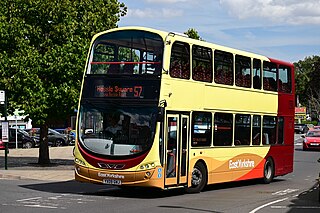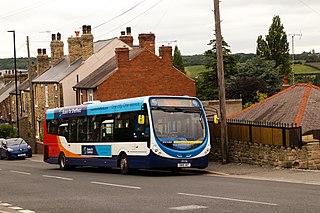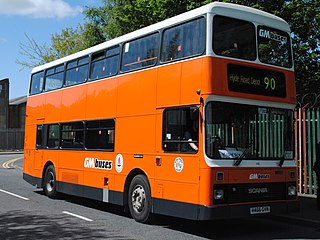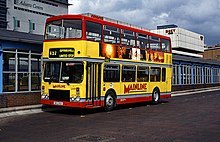
Stagecoach in Hull is a bus operator providing services in Kingston upon Hull, East Riding of Yorkshire, England. It is a subsidiary of Stagecoach East Midlands, a subdivision of the Stagecoach Group.

East Yorkshire operates both local and regional bus services in the East Riding of Yorkshire and North Yorkshire, England. Prior to acquisition by the Go-Ahead Group in June 2018, the company was known as East Yorkshire Motor Services.

Stagecoach Lincolnshire is a bus company, formerly known as Lincolnshire RoadCar, operating bus services throughout Lincolnshire. The company is a division of Stagecoach East Midlands, which is a subsidiary of the Stagecoach Group.

MTL Trust Holdings was an English bus, coach and train operator based in Liverpool, Merseyside. MTL was originally part of the MPTE. To comply with the Transport Act 1985, the bus operations were divested into a new independent company, Merseyside Transport Limited (MTL). Merseyside PTA retained shareholding, but the company was purchased by its management and staff in a £5.9 million Employee Share Ownership Plan in 1993. On 17 February 2000, MTL was purchased by Arriva for £85 million, with MTL's shareholding workers each receiving £13,500 in windfall gains from the sale.

Stagecoach West is a bus operator providing services in Gloucestershire, Bristol, Swindon, Oxfordshire, Wiltshire, North Somerset and Herefordshire, in the West of England. The company is a subsidiary of the Stagecoach Group.

Xplore Dundee is a bus operator based in Dundee, Scotland, operating services mainly within the city. The operator also runs a service to Edinburgh Airport. It is a subsidiary of McGill's Bus Services.

South Yorkshire Passenger Transport Executive (SYPTE) was the passenger transport executive for South Yorkshire. It was responsible for implementing policies set by the South Yorkshire Passenger Transport Authority (SYPTA) and for operation of the Authority's bus fleet from its formation in 1974 until its dissolution in 2023, when its assets and duties were transferred to the South Yorkshire Mayoral Combined Authority.

First South Yorkshire is a major bus operator providing bus services within and across South Yorkshire. It is a subsidiary of FirstGroup.

Stagecoach Yorkshire is an operating division of Stagecoach Group.

Yorkshire Traction was a bus operator in Yorkshire that operated from 1902 until 2005.

The Burnley Bus Company operates both local and regional bus services in Greater Manchester and Lancashire, England. It is a subsidiary of Transdev Blazefield, which operates bus services across Greater Manchester, Lancashire, North Yorkshire and West Yorkshire.

The Northern Counties Palatine was a step-entrance 2-axle and 3-axle double-decker bus body built by Northern Counties from 1988 to 1999 in Wigan, England.

GM Buses was a major bus operator serving the ten metropolitan districts of Greater Manchester in North West England. The company was formed in February 1986 by the Greater Manchester Passenger Transport Executive prior to deregulation on 26 October. In December 1993, it was split into GM Buses North and GM Buses South in order to increase competition for services in the area, before they were sold to the FirstGroup and Stagecoach respectively.

Stagecoach East is a bus operator providing local and regional services across the East of England, operating in the counties of Bedfordshire and Cambridgeshire. The company is a subsidiary of the Stagecoach Group and is headquartered and registered in Cambridge.
The Passenger Transport Executive (PTE) bus operations were the bus operating divisions of the passenger transport executives in the United Kingdom. In 1986 they underwent a process of deregulation and privatisation, forming some of the largest private bus companies in the UK outside London, with all being sold to their employees or management. Despite their relative size and lucrative operating areas, none of the companies survived beyond the late 1990s, with all falling into the hands of the major bus groups, who had their origins in privatised regional subsidiaries of the former National Bus Company and the Scottish Bus Group.

Articulated buses, colloquially known as "bendy buses", were rarely used in the United Kingdom compared to other countries, until the turn of the millennium. This was due to a preference for the double-decker bus for use on high capacity routes. In June 2006, there were over 500 articulated buses in the United Kingdom, although they were still heavily outnumbered by double deckers. The majority of this fleet was used in London, although these buses would be withdrawn by end of 2011.

The Alexander PS-type was a step-floor single-decker bus body built by Walter Alexander Coachbuilders in Falkirk, Scotland and was produced from 1988 to the late 1990s predominantly on the Dennis Lance, Mercedes-Benz O405, Scania N113, Volvo B10M chassis.

The Plaxton Pointer is a single-deck midibus body that was manufactured between 1991 and 2006, predominantly on the Dennis Dart chassis, by Reeve Burgess, Plaxton and latterly Alexander Dennis.

Strathclyde Buses was a bus operating company in Glasgow and west-central Scotland. It commenced operations in October 1986. Prior to 1986, the council-owned buses had belonged to Strathclyde Passenger Transport Executive, and therefore were owned by Strathclyde Regional Council. The new company, although still under the control of the Council, was no longer able to rely on the Council for any financial, or any other, help. In 1996 the company was taken over by FirstGroup. Its former operations are now part of First Glasgow.

Cleveland Transit was a municipal bus operator based in the former county of Cleveland in northern England, operating from 1974 until its purchase by the Stagecoach Group in 1994.

























